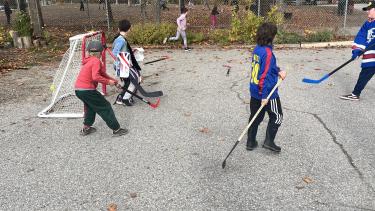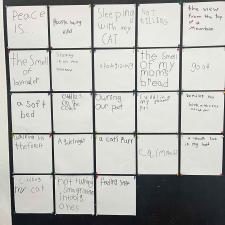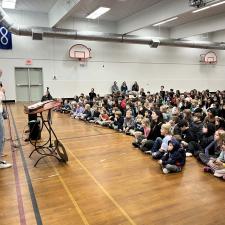Wandering Among the Wildflowers

Hello Wildflower Families,
I hope you are doing well and finding moments of warmth and light during this grey and rainy month. Even though the sun may not be shining outside, it’s certainly bright inside our school. Each of our class communities is bustling with activity as students work on term projects that are coming together beautifully. We look forward to welcoming you in December to showcase the incredible work your children have created to demonstrate their learning.
One of this month’s highlights was our Remembrance Day assembly, held on November 7th. Together, we took time to honor those who have made sacrifices so that we can enjoy the privileges and freedoms we have today. This included recognizing the contributions of Indigenous veterans through the symbol of the beaded poppy, and acknowledging conscientious objectors with the white poppy.
Reflecting on past and present conflicts also gave us an opportunity to consider how we deal with conflict in our daily lives. Conflict is a part of life and, although a world without it might sound ideal, it’s actually a vital part of our learning journey. None of us are perfect, and we all make mistakes—what matters is how we respond and grow. At Wildflower, we approach conflict through restorative principles.
Restorative principles, or restorative justice, are at the heart of how we work with students and staff to address unexpected behaviors in a respectful and supportive way. In informal settings, we use open, honest communication, empathetic listening, and thoughtful questioning to maintain a sense of connection with our students, colleagues, and even parents. Affective questions help us explore the impact of actions—either in our own reflections or in conversations with a group. Our respect agreements are created collaboratively, ensuring that everyone has a voice in shaping how we interact as a community.
We also use Collaborative and Proactive Solutions to honor students’ voices and provide them with choices on how to address behaviors they may struggle with that don’t meet the needs of our classroom communities. This doesn’t mean there aren’t consequences—there are natural outcomes tied to all actions. In our conversations with students, we help them understand these connections and recognize their role in what has happened.
Our goal is to make sure every student feels safe and has a sense of belonging at school. We believe this approach, supported by educational research, is the best way to foster growth and nurture the whole child. I hope this provides some helpful insight, and I would be glad to meet and discuss in more detail how we handle conflict at Wildflower.




